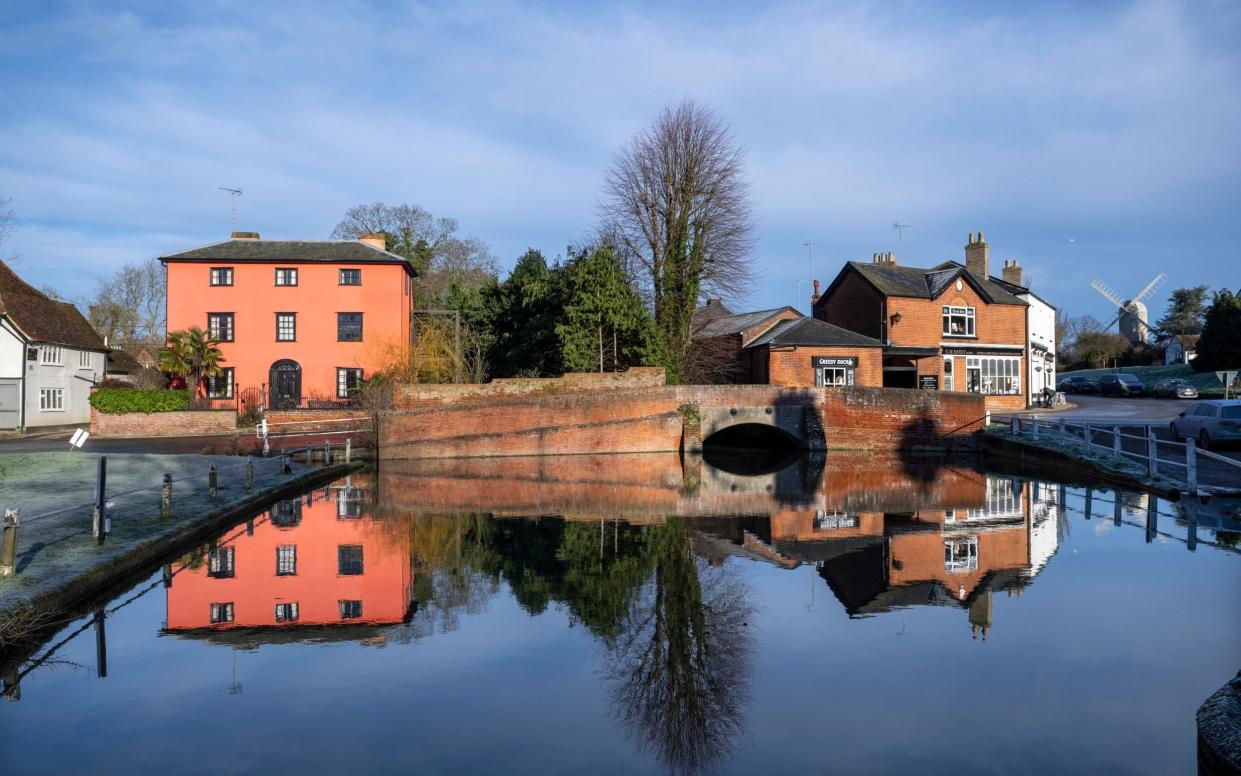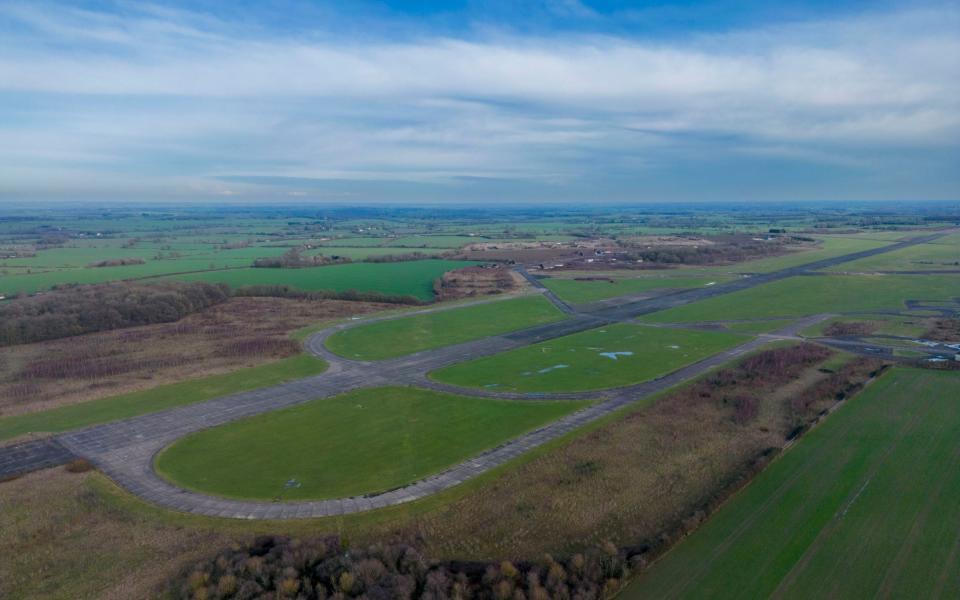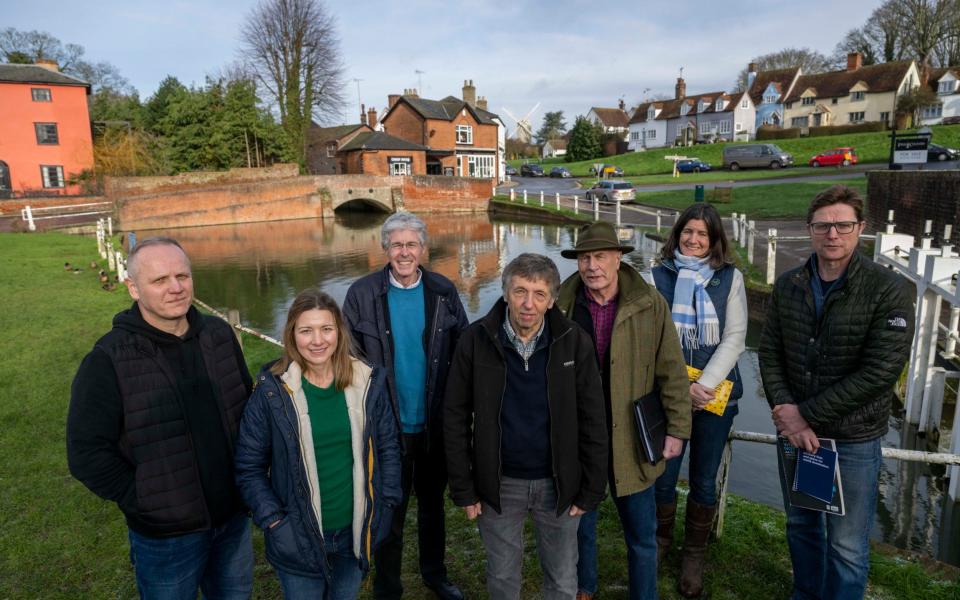Idyllic Essex villages could become home to biggest prison complex in the country

Finchingfield has been described as the most photographed village in England, beloved by residents for its duck pond, hump-backed bridge, windmill and tea rooms.
But soon visitors may find a drastically different attraction – the biggest prison complex in the country.
The Ministry of Justice (MoJ) is consulting on plans to build two “mega” jails, on a former RAF base between Finchingfield and a picturesque neighbouring village, Wethersfield, which would hold 3,430 male prisoners.
Residents have stepped up a campaign to block construction of the prison facility, saying it would more than double the population of the area, increase road congestion and casualties, jeopardise local heritage, threaten wildlife and risk an environmental catastrophe.
Finchingfield is a popular visitor attraction, best known as a setting for popular BBC TV detective series Lovejoy. Historic Wethersfield, believed to be named after a Viking invader, has more than 100 listed buildings and is overlooked by the church of St Mary Magdalene, which dates back to at least the 12th century.

“This is bigger than Lakeside shopping centre, what they’re proposing here,” said Andrew Hull, chair of Wethersfield Airfield Scrutiny Committee (WASC), one of two organisations attempting to block the plans. “It’s almost like the worst place you could find a prison.”
The MoJ has claimed that the 800-acre site, which was used by the US Air Force during the Second World War and is currently occupied by the Ministry of Defence Police, would be an “appropriate” location for a Category B and Category C prison, as part of the department’s programme to provide an extra 20,000 places in custody by the mid-2020s.
Category B jails take prisoners directly from court and deliver training for all but the highest-risk inmates. Category C establishments are intended to help offenders prepare for release, with some allowed out temporarily.
In a public consultation document, the MoJ says each prison at the base would contain seven four-storey-high house-blocks, with industrial workshops, sports pitches, a gymnasium, kennels for guard dogs and parking space for 1,000 cars on the site.
The development would provide “long-lasting” benefits to the community, including around 1,400 new jobs, the paper says. “This would provide a chance for local people to build a career working in the criminal justice system,” although the two nearest existing prisons, Chelmsford and Highpoint, both 17 miles away, already struggle to attract and retain staff.

Recruitment is just one of a series of major problems identified by WASC, which comprises representatives from 13 parish councils, and the campaign group Stop Wethersfield Airfield Prison (SWAP). It has assembled a formidable local team of land development specialists, among them two lawyers, a retired head of town planning, an environmental lobbyist and the boss of a compulsory purchase and acquisitions company who advises on major infrastructure projects.
Colin Cottage, managing director of a compulsory purchase and acquisitions company who advises on major infrastructure projects, said he had never seen such a poorly thought out proposal in all his dealings with government. “In my experience, the MoJ’s proposals are unlikely to survive any proper financial scrutiny by the Treasury,” he said.
Transport is another key concern. The nearest rail station, Braintree, nine miles away, is on a branch line with infrequent services; buses are described as “unreliable”; while prison vans and suppliers would have to negotiate a network of winding country lanes and B roads to get to the location.
“Every route to the airbase has permanent pinch points, ancient houses, old walls built right up to the road and a number of old single-lane bridges,” according to analysis for WASC by Richard Sidebottom, a former World Bank consultant on social economics who moved to Wethersfield 21 years ago.
The MoJ would not have to pay to acquire the site, because it’s government-owned land, but the building work is likely to cost more than £500 million, based on the amount spent on other prisons.
In his report, Sidebottom, 56, concludes that the MoJ’s proposal is a “thinly disguised pursuit of cheap real estate” that would cause “irreversible damage” to community cohesion and the natural environment, because the airbase contains a designated wildlife site with hundreds of plant and animal species, while parts of the land may be contaminated by chemicals.

The campaigners, who have spent £40,000 consulting experts to counter the MoJ’s arguments, dismiss suggestions that they are NIMBYs (not in my own back yard), saying they have proposed viable, alternative uses for the site, including a community-owned solar farm, affordable housing and heritage centre, as well as walking, horse-riding and cycling trails.
“It’s not about prisoners, per se, it’s about the inappropriate development,” said Juliet O’Brien, 44, whose family have farmed land next to the airbase for 80 years. “The strength of feeling against it makes me think that we can do something a lot better here.”
Residents have raised concerns with local MP, James Cleverly, the Foreign Secretary, and members of Conservative-controlled Braintree District Council, ahead of local elections in May. They’re prepared to take legal action, if necessary, to force the Government to scrap the project.
The MoJ, which has yet to submit a planning application to the council, said whenever it builds new prisons it works with the local community to address their concerns, by exploring traffic solutions and planting trees to help protect the local environment.
A spokesperson said: “We recognise residents are seeking clarity and while no decision has been made, we will continue to consult and update them as our prison-building plans develop.”

